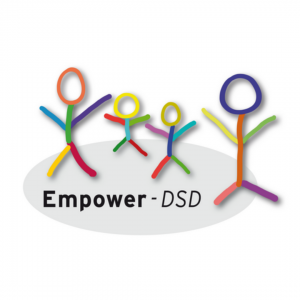 Empower-DSD is a clinical research project funded by the German Government. It brings together 5 DSD Clinics in Germany (Berlin, Lübeck, Münster, Ulm, Bochum). The project started in 2019 and has included a number of peer support workshops for different DSD conditions. This symposium will present the first results of the project and how it’s contributing to healthcare improvements for those with DSD conditions.
Empower-DSD is a clinical research project funded by the German Government. It brings together 5 DSD Clinics in Germany (Berlin, Lübeck, Münster, Ulm, Bochum). The project started in 2019 and has included a number of peer support workshops for different DSD conditions. This symposium will present the first results of the project and how it’s contributing to healthcare improvements for those with DSD conditions.
The event is open to everyone and is free of charge. It will be in person and will be in German.
The Program:
- 0930 – 1030: Arrival and Registration
- 1100 – 1230: Empower-DSD: Lectures on selected results
- 1230 – 1330: Lunch
- 1330 – 1500: Care over the lifespan
- 1500 – 1530: Break
- 1530 – 1615: Workshops
- 1630 – 1715: Presentation of the workshop results and conclusion
- 1830 – 2045: Social get together
For more information, to contact the organisers or to register, follow the link.
About the projects
Empower-DSD through this project provided information and psychological support workshops modelled on those used in other chronic conditions (e.g. asthma). They provided workshops for the following diagnoses: Turner syndrome, Klinefelter syndrome, MRKH, CAH Classic, CAH Late onset, 46 XX/46 XY DSD.
We include a testimonial from Frieda, who attended the first MRKH workshop who shares her experience and the value it provided:
“We were a small group with 9 wonderful MRKH people. The meeting started on a Friday around noon and ended around evening. On Saturday we met early in the morning and finished in the afternoon. On Friday, the speakers were a paediatrician, a psychologist and “our” paediatric and adolescent gynaecologist, who diagnosed our MRKH. The paediatrician told us a little about the cause of MRKH, a little about hormones and MRKH and “our” paediatrician and adolescent gynaecologist explained the anatomy again, told us about different surgical techniques, about the stretching method and also a lot about the possibilities of having children.
First we all introduced ourselves. Then we watched an MRKH documentary by TruDoku with another MRKH sufferer (Janina Brandes) and then there were the various lectures by our speakers. They were not boring lectures, but they were more interactive with a lot of space for exchange. A space where everyone could open up and allow emotions. On Saturday, two other wonderful MRKH people (Sophie and Nellie) joined us via video and we could share our questions, fears, etc. with them. The rest of the day on Saturday there was plenty of time and space for sharing. The psychologist had prepared questions which we could answer and thus get into the exchange. There were also phases where we exchanged in small groups. The questions dealt with our environment and the diagnosis, our sex life, problems, desire to have children and many other topics.
It was two wonderful days with wonderful people. I was really happy that we had the opportunity to get to know such wonderful MRKH people and that I was able to take away some of their fears and help them with my experiences”
MRKH Connect can not be held responsible for the information that you receive from third party content.
Leave A Comment